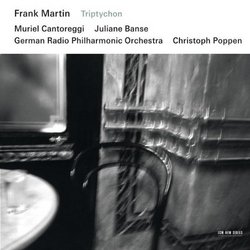First-class versions of the 'Bachian' Martin
Nicholas A. Deutsch | New York, NY USA | 02/05/2009
(5 out of 5 stars)
"This CD is a stand-out even among the many fine new recordings of Frank Martin's music that we've been fortunate to hear recently. The 3 works rank high in his output - and Polyptyque is one of the indisputable masterpieces - and the performances are truly superb.
The organizing idea behind the disc is the spirit of J.S. Bach in Martin's work, and indeed hearing the St. Matthew Passion at a young age left a profound mark on the composer, so that he always considered Bach his master. Nonetheless, it's important to remember that Martin's mature music is a mix of French and German characteristics, just as it is of Classical and Romantic impulses, all unified by a very personal use of elements of Schoenberg's 12-tone theory. In particular, his concern for orchestral color, often subtle and luminous, is very apparent here.
Taking the works in chronological order: the Passacaille (Passacaglia)began life in 1944 as Martin's only work for organ solo; he arranged it for strings in 1952, and for full symphony orchestra in 1962 - this last is the version heard here. It's a beautiful meditative piece, beginning and ending quietly, but building to an imposing climax. The Marian Triptych (1967-8) consists of 3 'panels,' a central Magnificat flanked by an Ave Maria and Stabat Mater (the last in Latin, the first 2 in Martin Luther's German version). This was composed for the wife/husband duo of soprano Irmgard Seefried and violinist Wolfgang Schneiderhan, hence the use of German rather than Martin's first language, French. It is definitely a work for the concert hall, not the church, but fully embodying Martin's deep Christian faith; the Stabat Mater in particular takes advantage of Seefried's great dramatic gifts to paint a desolate, painful picture that resolves gradually through prayer to healing. In the Polyptych: Six Passiontide Pictures (1973), Martin takes the pictorial concept further, presenting 6 brief, highly contrasted (three pairs of fast-slow movements) vignettes of Christ's Passion. The demanding solo violin part, composed for Yehudi Menuhin, is placed against two small string orchestras, used with the greatest expressiveness and imagination.
These are simply wonderful performances, and shows what can happen when artists of the highest caliber take on the challenges of Martin's music. They rank with the finest performances of the individual works to appear, and that of Polyptyque in particular is a triumph.
And now for the fly in the ointment. For some unfathomable reason, ECM have provided neither texts nor translations for the Maria-Triptychon - effectively pulling the rug out from under the artists. All four previous recordings of this work - on Chandos, New Albion, Koch Treasure and Jecklin (the last a live performance with Seefried, Schneiderhan and Martin) - have printed them in their booklets. So listeners will definitely need to make the effort to get hold of one of these; indeed, you might consider getting the Chandos disc, which has fine performances by David Wilson-Johnson of Martin's Six Monologues from Jedermann and excerpts from his opera Der Sturm (The Tempest). A blot on ECM's reputation, but not on these performances.
"

